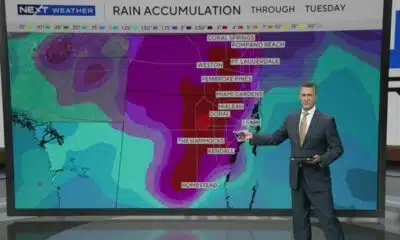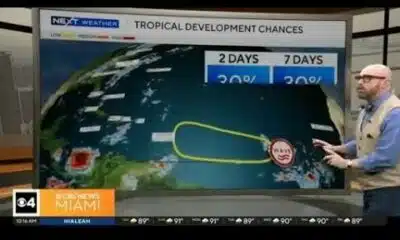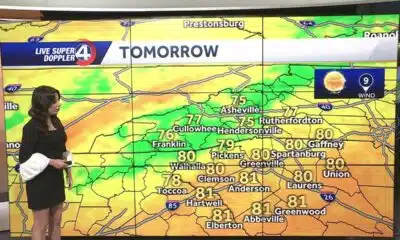News from the South - West Virginia News Feed
Lawmakers gave Birth to Three workers a raise, but WV cut pay for program’s virtual therapists
by Amelia Ferrell Knisely, West Virginia Watch
July 21, 2025
West Virginia lawmakers put $17 million in the state budget for a pay increase for Birth to Three workers, who hadn’t seen a raise in more than two decades. The successful program provides free services to babies and toddlers who have developmental delays.
And, while most workers are getting a raise, the state Department of Health is going to cut pay for virtual therapists, who often provide services to children in rural areas where there’s a shortage of local therapists.
The pay cut — especially as the state is struggling to retain its workforce — came as a surprise to lawmakers.
“I don’t think I will speak for myself when I say I didn’t hear from a single legislator who was in favor of cutting the pay to any Birth to Three service provider. This was a department decision,” said Sen Ben Queen, R-Harrison, who serves on the Senate Finance Committee. Queen’s 1-year-old son is receiving services through the program.
“It does disappoint me,” he added. “I think the department celebrated and spiked the football that they got pay raises for their employees and then passed down a pay decrease.”
Katie Comer Reidy has worked as a speech therapist with Birth to Three for nearly 10 years and now provides virtual services. It’s “such a happy job,” she said. She uses Zoom to coach families on how to help their children reach milestones.
According to the state health department, the rate for virtual providers will decrease by 15%.
“I was excited to see that Birth to Three got a raise … but I was disappointed to see that the virtual providers took a bit of a cut. I do feel that the virtual providers are a big part of Birth to Three now,” said Comer Reidy, who lives in Charleston. “I fear that it will decrease the amount of virtual providers, and then, because of that … some of these families in rural counties might have a harder time getting the services that they need.”
Birth to Three started offering virtual services to children during the COVID-19 pandemic.
Gailyn M. Markham, director of communications for the state Department of Health, said that while determining the pay rates, the agency wanted to “ensure the state’s budget for the Birth to Three program could meet the growing needs of children and families in West Virginia.”
Birth to Three served 8,510 children in 2023. The program’s budget needs to account for the growing number of children, as well as a decreasing number of Medicaid-eligible children following the “unwinding” of Medicaid post-pandemic and increasing costs of assistive technology, Markham explained.
“The funding provided by the state Legislature was based on the department’s projected need after these factors were evaluated,” she wrote in an email, adding that the state also receives $2.2 million in federal funding for the program.
“To meet the needs of families during the pandemic, virtual services were permitted and reimbursed at the in-person rate. Post-pandemic, virtual services will remain allowable but the rate was reduced by 15%, recognizing that services provided virtually and at the service provider location are able to be offered at a lower cost than in person services,” she continued.
‘It’s a serious issue’
Not every state has a no-cost program like Birth to Three, which can be especially critical as West Virginia has the highest rate of prenatal exposure to drugs. This puts these children at a higher risk for a variety of physical and mental disabilities, and experts say early intervention is key.
Birth to Three uses 900 practitioners to provide physical, speech and occupational therapies and other services to children in all 55 counties. It served 16% of the state’s zero to 2-year-old population in 2023.
Comer Reidy said one of the most rewarding parts of the job was connecting with parents — not just the child who is being helped. “You then become a person that moms and dads will call when they’re having a hard time, and you [are] able to be a support system for somebody,” she said.
During the legislative session, the House of Delegates and Senate each pushed bills that specifically gave Birth to Three workers a raise.
Sen. Brian Helton, R-Fayette, introduced a version in the Senate, and it passed through the chamber unanimously but got held up in the House Finance Committee, where state budget concerns regularly stalled bills with price tags.
His bill proposed a 25% increase raise for all workers; he said the allocated money in the final state budget would give in-person therapists around a 15% raise.
“These are the most vulnerable children in our society, the ones having problems getting off to a good start,” Helton said. “When you look at inflation over the past decade or so, and you consider the fact that in today’s environment, it’s hard to find good quality, skilled people from lots of positions that we as a state, we just couldn’t afford to take chances to lose these workers who provide such valuable service.”
Helton was also surprised to learn that pay had been cut for virtual providers, saying, “You never like to see anyone get a decrease.” But he said that in-person therapy offered benefits for children, and the pay increase could push more therapists to provide in-person services.
“When you look at all the numbers, my understanding was some of that was done just to drive more people out into the field and to ensure that they’re actually getting … in person with people that work with these babies,” Helton said.
Queen said the Senate Finance Committee will be looking into why the pay was cut for virtual providers.
“It’s a reality of some sort of a budget issue that they didn’t share with us in a hearing process. And I hope we can get to the bottom of it sooner than later and not discourage people from leaving the system,” he said. “I haven’t personally heard of anyone jumping ship, but I can tell you that when you decrease someone’s pay in 2025 when the rest of the folks inside the very same department got a pay raise, it’s very discouraging.”
He continued, “It’s a serious issue, and I hope that this creates more conversation and transparency. We want departments to be successful.”
YOU MAKE OUR WORK POSSIBLE.
West Virginia Watch is part of States Newsroom, a nonprofit news network supported by grants and a coalition of donors as a 501c(3) public charity. West Virginia Watch maintains editorial independence. Contact Editor Leann Ray for questions: info@westvirginiawatch.com.
The post Lawmakers gave Birth to Three workers a raise, but WV cut pay for program’s virtual therapists appeared first on westvirginiawatch.com
Note: The following A.I. based commentary is not part of the original article, reproduced above, but is offered in the hopes that it will promote greater media literacy and critical thinking, by making any potential bias more visible to the reader –Staff Editor.
Political Bias Rating: Center-Left
This article presents the issue of Birth to Three pay structures in a largely factual and balanced way, quoting both state legislators and program participants. However, it emphasizes concerns about cuts to virtual therapist pay and highlights the voices of affected individuals, which may suggest mild sympathy for public service workers and social programs—an approach often aligned with center-left perspectives. The article avoids overt editorializing, but its focus on the impact of budgetary decisions on vulnerable populations and rural families lends a subtle tilt toward progressive social advocacy.
News from the South - West Virginia News Feed
WV Supreme Court will hear BOE’s appeal in vaccine lawsuit — but not right away
by Lori Kersey, West Virginia Watch
September 5, 2025
West Virginia’s highest court will take on a legal battle over the state’s school vaccination requirements, but it denied a request by state school officials that it do so quickly.
The state Supreme Court on Thursday set a deadline of Dec. 12 for the West Virginia Board of Education to prepare its appeal of a Raleigh County judge’s July ruling against it. That ruling was in regards to a lawsuit brought by three Raleigh County families over the board’s refusal to accept religious exemptions to the state’s mandatory school vaccine requirements.
Raleigh County Circuit Judge Michael Froble in July granted a preliminary injunction in the case that allows students in the case to attend class with a religious exemption to the vaccination requirements.
The school board had filed notice of appeal and asked the high court to both expedite a review of the appeal and temporarily halt the proceedings in the lower court.
In the scheduling order Thursday, the court denied both motions. Justices also set a deadline of Jan. 26 for the plaintiffs in the case to respond to the board’s appeal. The board will then have until Feb. 16, 2026 to write a reply, if necessary.
After the Feb. 16 reply brief deadline, the court writes, the appeal will be ready for review.
The Raleigh lawsuit is one case in a legal battle over religious freedom and the state’s strict school vaccination requirements. Every state requires school students to be vaccinated against a number of infectious diseases including polio, chicken pox and measles. Florida officials announced this week plans to eliminate its vaccine mandates.
West Virginia has been one of only five states that have not allowed students to opt out of the shots because of their religious or philosophical objections to them.
West Virginia Gov. Patrick Morrisey issued an executive order on his second day in office requiring the state to allow religious exemptions. His order is based on the 2023 Equal Protection for Religion Act. He argues that the religious freedom law, when read alongside the vaccination law, calls for the religious exemptions.
Morrisey has not rescinded that executive order, even though the state Legislature earlier this year rejected a bill that would have established those religious exemptions in state code.
Raleigh County Circuit Judge Michael Froble has scheduled a two-day hearing next week on a permanent injunction in the lawsuit, which he recently consolidated with a lawsuit brought against the state health department by two parents of immunocompromised students over its issuance of religious exemptions. Plaintiffs in that case are represented by the ACLU of West Virginia and Mountain State Justice.
The hearing is set for Sept. 10 and 11 at the Raleigh County Judicial Center. During that hearing, the judge has said he wants to consider issues that include whether the state’s vaccination law is constitutional without religious exemptions and the authority of Morrisey’s executive order.
YOU MAKE OUR WORK POSSIBLE.
West Virginia Watch is part of States Newsroom, a nonprofit news network supported by grants and a coalition of donors as a 501c(3) public charity. West Virginia Watch maintains editorial independence. Contact Editor Leann Ray for questions: info@westvirginiawatch.com.
The post WV Supreme Court will hear BOE’s appeal in vaccine lawsuit — but not right away appeared first on westvirginiawatch.com
Note: The following A.I. based commentary is not part of the original article, reproduced above, but is offered in the hopes that it will promote greater media literacy and critical thinking, by making any potential bias more visible to the reader –Staff Editor.
Political Bias Rating: Centrist
The content presents a factual and balanced overview of the legal dispute surrounding vaccine exemptions in West Virginia without evident partisan language or framing. It reports on actions taken by government officials, court decisions, and ongoing lawsuits from multiple perspectives, including those of the state board, families, and advocacy groups. The neutral tone and focus on legal developments suggest a centrist approach, aiming to inform rather than persuade toward a particular political viewpoint.
News from the South - West Virginia News Feed
Christian’s Morning Forecast: Strong to Severe Storms Incoming
SUMMARY: Storm Watch meteorologist Christian Boler reports strong to severe storms approaching West Virginia, especially McDow, Tazewell, and Wyoming counties during the morning commute. Temperatures will remain in the upper 60s to low 70s with southwest winds around 5-10 mph. A marginal severe weather threat exists across the region, mainly involving winds and flooding, but no tornadoes or hail expected. Rainfall of a quarter to half an inch is likely over 48 hours with isolated downpours. Storms will arrive in two waves before clearing Friday. Another front may bring showers Saturday, but high pressure will clear skies for the weekend and beyond.
FOLLOW US ON FACEBOOK AND TWITTER:
https://facebook.com/WOAYNewsWatch
https://twitter.com/WOAYNewsWatch
News from the South - West Virginia News Feed
More states guarantee students the right to school-day religious instruction off campus
by Robbie Sequeira, West Virginia Watch
September 4, 2025
In the past month or so, federal courts have dealt a string of blows to conservatives’ push for the biblical Ten Commandments to be posted in public schools.
Yet as states lose over required religious displays, many are working on another route to faith-based education by allowing kids to attend off-campus religious instruction. This year, Iowa, Montana, Ohio and Texas passed laws guaranteeing parents the right to have their children excused during the school day for free, off-campus religious instruction, often called “released time.”
Those four states are the latest of at least 12 that require school districts to offer released time religious schooling upon parental request, including: Florida, Hawaii, Kentucky, New York, North Dakota, Pennsylvania, Vermont and Wisconsin.
The released time approach may be more likely to pass constitutional muster than other government-imposed religious efforts, experts say, by shifting influence off school grounds and under the direction of faith-based groups rather than public school teachers, and by making it free to students.
A 1952 U.S. Supreme Court decision in Zorach v. Clauson allows for released time religious instruction as long as it’s off school property, privately funded and parent permitted.
“Not every family has access to private or parochial school, but for many generations families have been able to take their students out of school for a portion of the day for religious education if they choose,” said Jennifer Jury, a program advocate for LifeWise Academy, an Ohio-based Christian nonprofit founded in 2018.
The organization has been active in expanding its reach and lobbying lawmakers for stronger legislative support. This school year, LifeWise expects to serve nearly 100,000 public school students across 1,100 schools in 34 states, Jury said.
The off-campus gatherings work the same way in most states: With parents’ approval, public school students sign out of school during a lunch, recess or study hall block. Students will either walk or ride one of the distinctive red LifeWise buses to a local church or a program-leased community building in town.
And depending on state limitations for the religious instruction, for either a half or full hour, kids will learn about the Bible. When the allotted time is up, students go back to their public school to finish the day.
In some states, students can earn academic credit for the off-campus instruction, which has been more controversial.
In Montana, for example, legislation that would have required school districts to develop policies for academic credit was amended to “authorize” a district to allow credit, after pushback from the state’s school boards and school administrators associations.
“School districts should have the autonomy to determine which external coursework aligns with the academic frameworks and whether such courses should be eligible for credit,” Rob Watson, who represented the two groups at the legislature, said in his comments to a House committee in February. He noted the groups did not oppose the released time policy itself.
Despite the changes, only one Democrat in the legislature voted “yes.” Montana GOP Gov. Greg Gianforte signed the bill into law in May.
Supporters had touted the academic credit option as a way to entice homeschooling families to consider public schools. In her interview with Stateline, Jury noted similar programs that accommodate Jewish, Muslim and Mormon faith-based teaching for public school students.
“Whether a person is religious or not, the Bible is widely recognized as one of the most influential books in history,” Jury said. “A lot of our Western culture was born out of ideas that come from the Bible, like the fact that every person is created equal, that we are to love our neighbor.”
Identical bill language
The conservative American Legislative Exchange Council, known as ALEC, in August adopted model legislation about released time policies that state lawmakers can propose.
Public schools would be required to allow dismissal for religious instruction under new bill
ALEC’s proposal would allow from one to five hours per week of off-campus religious instruction and would require school districts to award academic credit if the course meets certain criteria. Districts would have to assess instruction based on secular standards and would not be allowed to test for particular religious content, according to the model legislation.
Nearly identical language had already appeared in several state bills, including in North Carolina and West Virginia this year and in Mississippi in 2023. In North Carolina, LifeWise Academy registered with the secretary of state’s office in 2024, as reported by NC Newsline, and a released time bill was introduced in February. It was sent to committee but never moved ahead.
The bills in Mississippi and West Virginia also stalled.
Legislation that does become law earns praise from groups such as Alliance Defending Freedom, one of the nation’s most active legal organizations opposing abortion rights and same-sex marriage.
Statements from Greg Chafuen, senior counsel for the nonprofit’s Center for Public Policy, say the new released time laws respect “parents’ educational decisions” and ensure “parents are in the driver’s seat when it comes to their kids’ education.”
An Indiana law lets high school students leave school for religious instruction each week for an amount of time equal to one elective course. Ohio, Oklahoma, South Carolina and Tennessee laws allow students to earn elective credit for released time religious instruction, though it cannot replace a “core curriculum” class. School boards can set standards for when such programs qualify for credit.
LifeWise operates in each of those states.
Ten Commandment displays
Jury, of LifeWise Academy, said her organization wants off-campus religious options for public school students to be available in all 50 states.
“It’s important to note this is an option, and parents are the ultimate decision-makers in enrollment,” she said.
“We would love to see every student in the United States have the option to attend a program like LifeWise if they want to and if their parents want them to.”
A lack of parental choice might be what trips up state efforts to post the Ten Commandments in classrooms.
This is an option, and parents are the ultimate decision-makers in enrollment.
– Jennifer Jury, a program advocate for LifeWise Academy
After Louisiana last year became the first state in recent decades to require that the Ten Commandments, a central tenet of the Judeo-Christian tradition, be displayed in school classrooms, bills followed in at least 15 other states. Two states — Arkansas and Texas — enacted laws.
But for now, courts have blocked the mandates in all three states. In Texas, U.S. District Judge Fred Biery warned the displays “are likely to pressure [children] into religious observance” and undermine parents’ rights.
In Arkansas, U.S. District Judge Timothy Brooks called the state’s requirement to post a specific version of the Ten Commandments “plainly unconstitutional.”
The law “is not neutral with respect to religion,” he wrote. “By design, and on its face, the statute mandates the display of expressly religious scripture in every public-school classroom and library.”
He also noted that the law “requires that a specific version of that scripture be used, one that the uncontroverted evidence in this case shows is associated with Protestantism and is exclusionary of other faiths.”
Stateline reporter Robbie Sequeira can be reached at rsequeira@stateline.org.
This story was originally produced by Stateline, which is part of States Newsroom, a nonprofit news network which includes West Virginia Watch, and is supported by grants and a coalition of donors as a 501c(3) public charity.
West Virginia Watch is part of States Newsroom, a nonprofit news network supported by grants and a coalition of donors as a 501c(3) public charity. West Virginia Watch maintains editorial independence. Contact Editor Leann Ray for questions: info@westvirginiawatch.com.
The post More states guarantee students the right to school-day religious instruction off campus appeared first on westvirginiawatch.com
Note: The following A.I. based commentary is not part of the original article, reproduced above, but is offered in the hopes that it will promote greater media literacy and critical thinking, by making any potential bias more visible to the reader –Staff Editor.
Political Bias Rating: Center-Right
This content presents the growing trend of religious education programs in public school contexts with a generally favorable tone, highlighting legislative successes primarily in conservative-led states. The coverage includes references to conservative organizations such as ALEC and Alliance Defending Freedom, and discusses efforts to expand religious instruction in a way that aligns with conservative values emphasizing parental choice and the role of faith in education. However, it also acknowledges the legal challenges and concerns over constitutional boundaries, providing a balanced view that avoids outright advocacy or criticism. The framing and topics suggest a center-right perspective that supports religious accommodations within public education while respecting legal constraints.
-
News from the South - Louisiana News Feed6 days ago
‘They broke us down’: New Orleans teachers, fired after Katrina, reflect on lives upended
-
News from the South - Alabama News Feed7 days ago
Alabama state grocery tax to fall 1% on Monday
-
News from the South - Missouri News Feed5 days ago
Missouri joins dozens of states in eliminating ‘luxury’ tax on diapers, period products
-
News from the South - Tennessee News Feed5 days ago
Tennessee ranks near the top for ICE arrests
-
News from the South - South Carolina News Feed7 days ago
Warm and Mainly Dry Labor Day
-
Mississippi Today5 days ago
Trump proposed getting rid of FEMA, but his review council seems focused on reforming the agency
-
News from the South - Alabama News Feed6 days ago
Alabama union leaders say they’re fighting for the state’s middle class
-
News from the South - North Carolina News Feed6 days ago
NC Labor Day 2025: A state that’s best for business is also ranked worst for workers










































